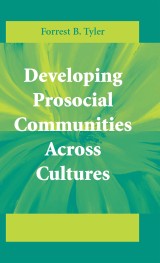Details

Developing Prosocial Communities Across Cultures
|
53,49 € |
|
| Verlag: | Springer |
| Format: | |
| Veröffentl.: | 23.09.2007 |
| ISBN/EAN: | 9780387714851 |
| Sprache: | englisch |
| Anzahl Seiten: | 164 |
Dieses eBook enthält ein Wasserzeichen.
Beschreibungen
<P>Communities are basic social units that provide contexts in which people live together to their mutual benefit. This book defines exactly what prosocial communities are, identifying their elements and relevant interrelationships, and reviewing the available evidence in support of those conclusions. This work shows why a prosocial community is essential to the accomplishment of the goals of community psychology and related fields, and offers advice on how to create such communities.</P>
<P>Communities are basic vital social units that provide the contexts in which people learn to live together to their mutual benefit. They are crucial to providing a richer and more fulfilling framework than we currently have for understanding and improving the quality of life for individuals and groups alike. The author defines what exactly prosocial communities are, identifying its elements and relevant interrelationships, and providing the available evidence in support of those conclusions. This work shows why a prosocial community is essential to the accomplishment of the goals of community psychology and its related fields, as well as how to create such communities.</P>
Definitions and Background Issues.- Psychosocial Integration: The Theoretical Framework.- The Current Situation: Psychologists’ Approaches to Community Change.- The Prosocial Effect of Changing One Aspect of a Community.- The Prosocial Effect of Coordinating Change in Two Aspects of a Community.- A Guide for Establishing Prosocial Communities.- Questscope: A Comprehensive Prosocial Community Program.
<P>Skillfully combining psychological knowledge and humanitarian wisdom, <EM>Developing Prosocial Communities across Cultures</EM> shows how nurturing environments can be rooted in the common concerns of people and institutions, while giving readers the steps toward achieving this goal. Psychologist/activist Forrest Tyler emphasizes individuals’ collective responsibilities—to themselves, each other, and society—and describes a coordinated balance of discrete social changes brought about by civic action, policy changes initiated by officials, and collaboration between professionals and the community. Instructive examples from locales as varied as Colombia, Jordan, and the United States offer models from which readers can form unique, innovative solutions. And the author’s multicultural/ multiethnic approach clearly maps out the road from theoretical concepts to real-world action:</P>
<P></P>
<UL>
<P>
<LI>Defining the prosocial community—core characteristics and elemental relationships. </LI>
<P></P>
<P>
<LI>Observing communities: assessing their potential for intervention, determining change objectives.</LI>
<P></P>
<P>
<LI>Thinking beyond traditional psychological/mental health approaches to community change.</LI>
<P></P>
<P>
<LI>Prosocial effects of community projects involving multiple levels of action.</LI>
<P></P>
<P>
<LI>Questscope: an extended example of community change in the Hashemite Kingdom of Jordan</LI>
<P></P></UL>
<P></P>
<P>Tyler’s decades of experience, and the lucid perspective of <EM>Developing Prosocial Communities across Cultures</EM>, brings social and community psychologists new assurance that social programs can have greater relevance to the people and groups they serve.</P>
<P></P>
<P></P>
<UL>
<P>
<LI>Defining the prosocial community—core characteristics and elemental relationships. </LI>
<P></P>
<P>
<LI>Observing communities: assessing their potential for intervention, determining change objectives.</LI>
<P></P>
<P>
<LI>Thinking beyond traditional psychological/mental health approaches to community change.</LI>
<P></P>
<P>
<LI>Prosocial effects of community projects involving multiple levels of action.</LI>
<P></P>
<P>
<LI>Questscope: an extended example of community change in the Hashemite Kingdom of Jordan</LI>
<P></P></UL>
<P></P>
<P>Tyler’s decades of experience, and the lucid perspective of <EM>Developing Prosocial Communities across Cultures</EM>, brings social and community psychologists new assurance that social programs can have greater relevance to the people and groups they serve.</P>
<P></P>
<p>Incorporates a multicultural, multiethnic approach with documentary research and programmatic support for its efficacy</p><p>Identifies and demonstrates the nature of the links between community and individual functioning in ways that aid readers in understanding them</p><p>Provides examples to enable people seeking community changes to know how to effectively translate these ideas into practice</p>
<P>Communities are basic vital social units that provide the contexts in which people learn to live together to their mutual benefit. They are crucial to providing a richer and more fulfilling framework than we currently have for understanding and improving the quality of life for individuals and groups alike. </P>
<P>In this book, the author presents a definition of a prosocial community. He identifies its elements and relevant interrelationships, and provides the available evidence in support of those conclusions. This work shows why a prosocial community is essential to the accomplishment of the goals of community psychology and its related fields as well as how to create such communities.</P>
<P>In this book, the author presents a definition of a prosocial community. He identifies its elements and relevant interrelationships, and provides the available evidence in support of those conclusions. This work shows why a prosocial community is essential to the accomplishment of the goals of community psychology and its related fields as well as how to create such communities.</P>

















